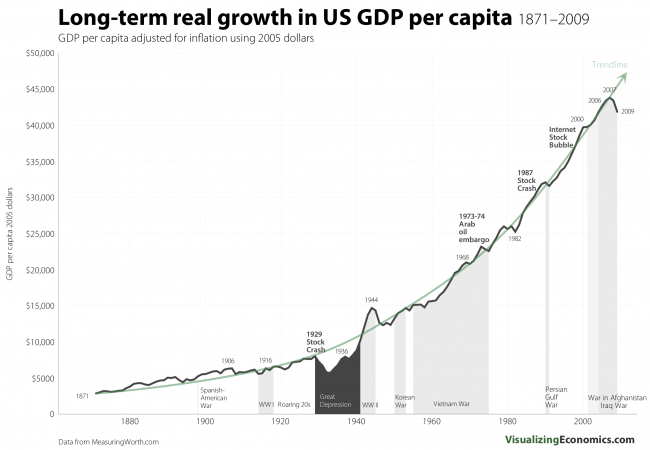
|
20A001 Hindsight by Jim Davies, 1/7/2020
The convention in the eye-testing business is to call perfect vision "2020" - and here we are, starting a year that happens to use the same nomenclature. There is a common claim that "hindsight is always 2020" and while that's far from accurate, hindsight certainly helps. Let's look. My (free) e-book Denial of Liberty shows briefly what has taken place since the dreadful day that government appeared; and it's little wonder that the subject of "history" has been largely dropped from government school curricula, or else so distorted as to be hardly recognizable. Every chapter of it, no matter the country or time period, is drenched with blood shed in wars initiated by governments and by tales of intrigue to transfer power from one person or group to another, within those governments. Sooner or later, if those facts are presented in class the brighter students, at least, are bound to start asking the fatal question: if government is that vicious, who needs it? According to Spencer Wells' remarkable book The Journey of Man, humans took a significant evolutionary step forward 50- or 60,000 years ago and migrated out of Africa, dispersing over all the world as hunters and gatherers. Some headed North East into Siberia and after a long period, crossed thence into America over the Bering land bridge; strong echoes of their way of life were encountered by European settlers after Ericsson and Columbus re-discovered the Continent. That way of life did not, tragically, include any arrangement for the ownership of land; hence the conflict; and it didn't do so because few if any had developed fixed agriculture, the system of staying in one place, farming and storing food. That development had occurred about 10,000 years ago in the Middle East, but native Americans didn't know. Shortly after that epochal discovery government appeared, in the form of thieves who found it easier to steal stored produce or herded animals than to labor at sowing, harvesting etc. That was the origin of government; so it has been around for one fifth of the time that hom.sap. has walked the Earth. Put differently, we humans managed without government for 80% of our history. How exactly it first appeared cannot be known, but theft and war was the defining characteristic of government, and still is. Two main theories, with a third - my own "Slippery Slope" theory - are discussed in Origins. No evidence has been found of warfare prior to then, but there's ample evidence of it ever since; organized theft and murder are the defining marks of government and that's true of every era, including all of American history. British and French colonizers warred over territory, Native Americans were savagely suppressed by the winners, and since Independence there have been about 115 wars domestic (to grab extra land from Spain and Mexico for example) and foreign (to build and enlarge an overseas US Empire.) War is one - but only one - of the ways in which government fritters away what useful work has produced. The whole wonderful story of mankind is his success in developing tools for more efficient work; this attribute long predated fixed agriculture but blossomed greatly after it, for much more spare time (for thinking about smarter ways to work) became available then. That's what capitalism is, rightly defined. But if that surplus (in the form of time, or buildings, or clothes...) is stolen and wasted, progress is stunted. That's what government has always done. Consider some numbers. Suppose a free society produces a surplus or growth of 3% a year, average. Over 100 years, that growth will raise living standards by 1.03 to the power of 100, which is a 19 times multiplier. Yes; in just one century, an annual 3% growth makes people 19 times better off. Visualizing Economics produced this chart of US GDP per capita between 1871 and 2009; GDP isn't a good measure, but it's the best available. How high would it have been without all that waste and restriction? One indicator: after China scrapped its Marxist curbs on enterprise, an annual 9% GDP growth rate was enjoyed for many years. I think that here, after the total disappearance of government, it will be higher yet. So the above 3% example looks very conservative indeed. On just that modest 3% basis, however, discarding government would lead to a 19-times multiplier in wealth and living standards over one century, as against the 9-times multiplier actually achieved under government in the last one. Extend that math from one century to ten, or to the hundred centuries since government entered history, and your calculator may run short of zeroes. Denial of liberty has been disastrously expensive, in material prosperity as well as in the devastation of human lives - of which governments extinguished over 200 million in the 20th Century alone. Anyone unable to see that does not have anything close to 2020 vision.
|
|
||||||||||||||||||||||||||||||||||||||||||

 Eyeball it for the century 1909 to 2009 and we see a growth (in real terms) from $5000 to $45000, ie a 9-times multiplier. That averages 2.2% per year, despite the fact that government restricted enterprise and caused massive waste during the whole period - including participation in three major wars.
Eyeball it for the century 1909 to 2009 and we see a growth (in real terms) from $5000 to $45000, ie a 9-times multiplier. That averages 2.2% per year, despite the fact that government restricted enterprise and caused massive waste during the whole period - including participation in three major wars.








